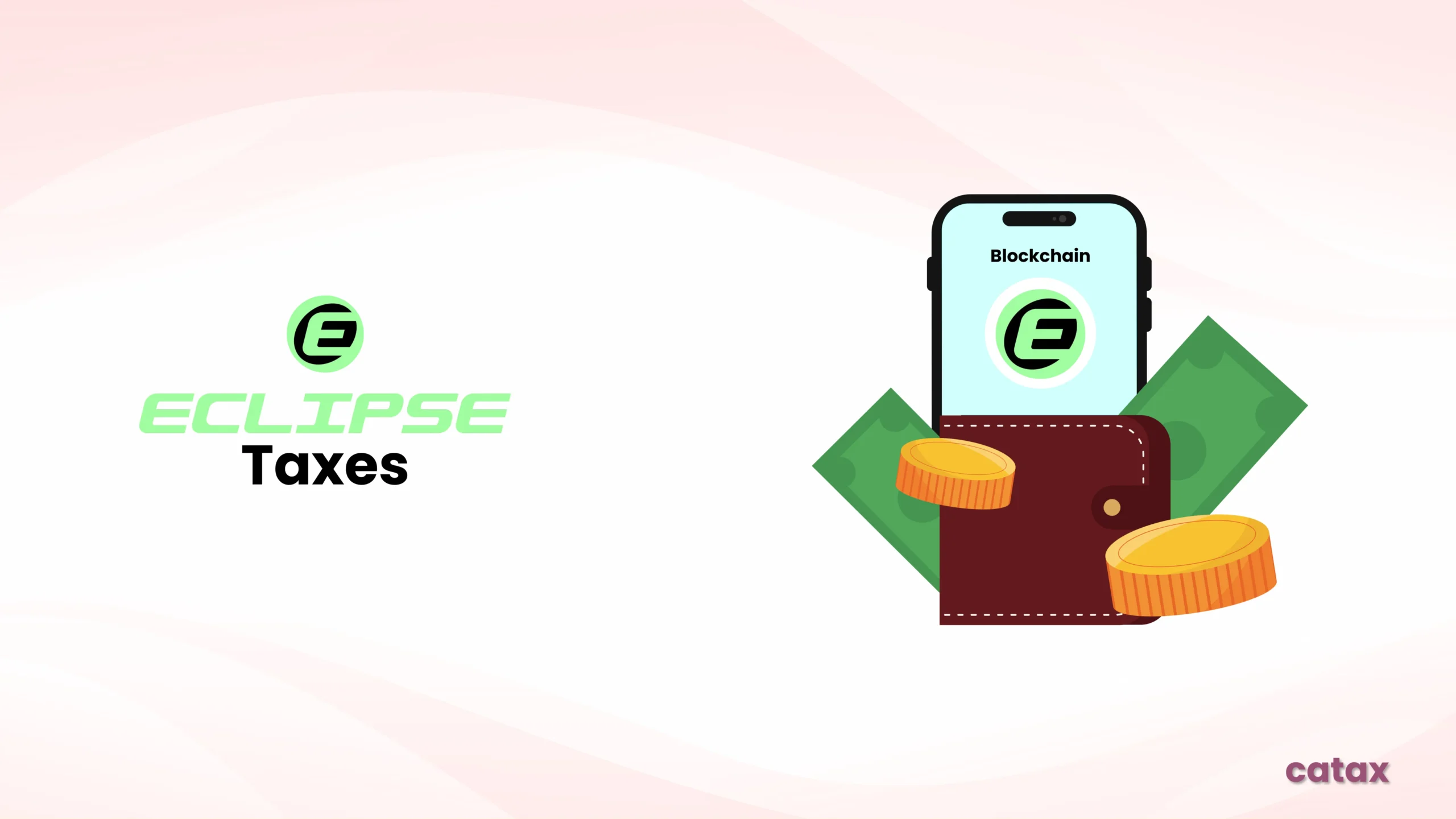Cryptocurrency tax rules vary by country, and Eclipse (ECP) taxes transactions may be taxed differently depending on local regulations. Whether you buy, sell, trade, or stake ECP, understanding how tax authorities classify these activities helps you stay compliant and avoid penalties.
This guide simplifies Eclipse tax rules so you can manage your taxes confidently and stay on the right side of the law.

How to Connect Your Eclipse Wallet to Catax?
To track your Eclipse (ECL) transactions and calculate taxes effortlessly, follow these steps to connect your wallet to Catax:
- Access Your Eclipse Wallet, Open your Eclipse wallet or use a supported block explorer or wallet platform (like Ledger, Eclipse native wallet, etc.).
- Copy Your Public Address, Locate and copy your Eclipse wallet’s public address.
On Catax:
- Log in to your Catax account and choose your country.
- Select Chain, then search for Eclipse Wallet.
- Paste your Eclipse public address and click Connect.
Once connected, Catax will begin syncing your ECL transactions and help automate your crypto tax calculations.
Calculate My Taxes ➤Are Eclipse (ECL) Transactions Taxable?
Yes, in most countries, Eclipse (ECL) transactions are taxable. Tax authorities may classify ECL as a capital asset, property, or income depending on how it’s used.
When Do You Have to Pay Taxes on Eclipse (ECL)?
You may need to pay taxes when you:
- Sell ECL for a profit – If you sell your Eclipse tokens for more than you paid, the gain is usually subject to capital gains tax.
- Trade ECL for another cryptocurrency – Swapping ECL for Bitcoin, Ethereum, or any other crypto can be a taxable event.
- Use ECL for purchases – Buying goods or services with ECL may trigger a taxable gain if the token appreciated in value.
- Earn ECL from staking – ECL earned via staking is typically treated as income and taxed when received.
- Receive ECL as payment – If you’re paid in ECL for goods or services, the amount received is generally taxed as income based on its market value at that time.
Because tax treatment depends on your local laws, always check your country’s crypto tax rules.
Can You Deduct Trading Fees and Other Costs?
Eclipse users often wonder if they can claim expenses related to trading or managing ECL. This depends on your local tax laws.
Some countries allow deductions for:
- Trading fees when buying or selling ECL
- Network/transaction fees for moving ECL between wallets
Others only allow deduction of:
- The purchase cost of ECL (your cost basis), without allowing extra deductions for fees or security tools.
Review your local tax regulations to know which expenses are deductible.
How Is Eclipse (ECL) Taxed Based on Holding Period?
Your tax rate on ECL profits may vary based on how long you held the tokens:
- Short-term holdings (less than one year) – Usually taxed at regular income tax rates.
- Long-term holdings (more than one year) – Some countries offer lower tax rates for long-term crypto gains.
- Flat-rate systems – In some jurisdictions, a fixed tax rate applies no matter how long you held your ECL.
Understanding your country’s tax rules can help you build a smarter tax strategy and possibly reduce your overall liability.ountry can help you optimize your strategy and lower your overall tax burden.
You can also check out our Country-Specific Guide for Crypto in Your country. This guide provides insights on regulations, tax implications, and compliance measures breifly explained for each country.
How Is Staking Income Taxed?
Staking Eclipse (ECLIPSE) can be a great source of passive income, but how it’s taxed depends on your country’s regulations. Some tax authorities consider staking rewards as taxable when received, while others only tax you when you sell or exchange the tokens.
How Countries Tax Staking Rewards:
- Taxed as income – In many jurisdictions, staking rewards are classified as income at the time you receive them. In this case, you’ll owe taxes based on your personal income tax rate.
- Taxed as capital gains – Some countries only tax staking rewards when you sell or exchange the tokens. You’re taxed only on the profit made from the sale.
If you’re staking ECLIPSE, it’s essential to know when your tax obligation begins. In some cases, you may be taxed even if you haven’t sold your staking rewards.
To avoid surprises at tax time, review your local tax treatment of staking before getting started with ECLIPSE.
Can You Claim Eclipse Losses for Tax Benefits?
Not every crypto investment ends in a profit. If you sell ECLIPSE at a loss, you may be able to claim tax benefits, depending on how your country handles crypto losses. How Different Countries Handle Crypto Losses:
- Loss offsets – In some regions, you can offset ECLIPSE losses against gains from other cryptocurrencies or investments, reducing your overall tax liability.
- Loss carryforward – If you don’t have gains in the current tax year, some countries allow you to carry your ECLIPSE losses forward to offset future profits.
- No or limited deductions – Certain jurisdictions don’t permit any deductions for crypto losses, meaning they won’t reduce your taxes.
To take advantage of any potential tax benefit, maintain clear records of your transactions and losses.
How to Stay Compliant with Eclipse Tax Rules?
As regulations around crypto continue to evolve, staying compliant with ECLIPSE tax rules is critical. Here are some best practices:
- Understand local tax laws – Know whether your ECLIPSE earnings are taxed as capital gains, personal income, or business income.
- Track your activity – Keep detailed records of every ECLIPSE transaction: buying, selling, trading, staking, or using it as payment.
- Use a crypto tax tool like Catax – Catax can help you automatically track, calculate, and file your ECLIPSE taxes with ease.
- Consult a tax advisor – Unsure about your obligations? A tax professional can help you interpret local laws and file accurately.
By staying informed and organized, you can manage your ECLIPSE taxes confidently and avoid compliance issues.
Book a Free Consultation Now →

